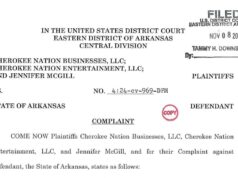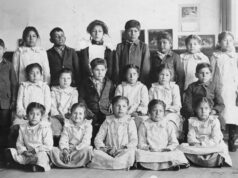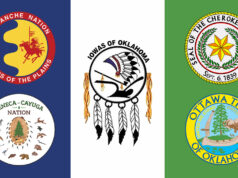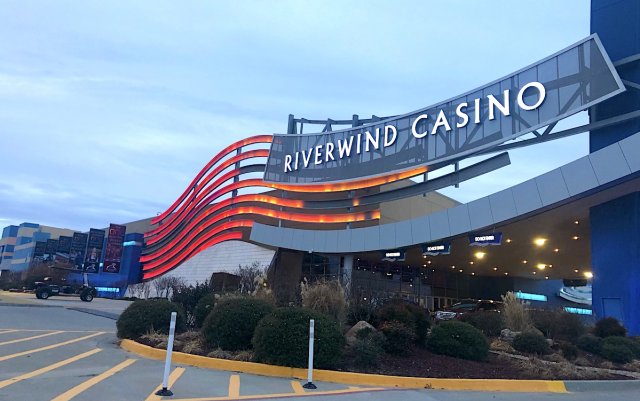
At 10 p.m. Friday, cars crowd the parking lot of Riverwind Casino just south of Norman. A cold front has chilled the December air, but a rainbow of neon lights warm the building’s sleek exterior.
Patrons file in — some wearing jeans and t-shirts, some wearing dresses or suit jackets. Decorating the casino’s entrance are promotions and discount offers. But on one pair of doors, a more somber sign proclaims: “There is help for problem gambling.”
Oklahoma ranks as the fifth most gambling-addicted state in America, with an estimated 75,000 problem gamblers and historically high numbers of gambling-related embezzlement cases. According to a June study from the National Council on Problem Gambling, 60 percent of surveyed state citizens think the gaming industry should do more to help addicts. Similarly, 38 percent think the government should do more.
“We’re third in the nation for number of slot machines, and yet we’re 20th in the nation in money for treatment, awareness and so forth,” said Wiley Harwell, director of the Oklahoma Association on Problem and Compulsive Gambling.
In Oklahoma, tribal nations have exclusive rights to operate casinos, except for games administered at horse racing tracks. The compact defining the state-tribal agreement is the subject of an ongoing and tense political fight. What no one disputes is that gaming revenue helps fund tribal programs for education, infrastructure, health care and more.
“(Gaming is) the cornerstone of our business portfolio, which means that it’s the cornerstone of our economic independence,” said Cherokee Nation Chief Chuck Hoskin Jr. “It has fueled so much of what we’ve been able to do.”
Harwell said tribal donations account for more than half his budget. He said some tribes also fund their own programs and health centers that address behavioral health issue, such as problem gambling.
“Tribes definitely participate,” Harwell said. “There are about five large tribes that contribute to us financially.”
The board of Harwell’s nonprofit includes a central voice in tribal gaming: Matthew Morgan, chairman of the Oklahoma Indian Gaming Association. Together, the two organizations lead Tribal Voices, a responsible gaming advocacy group that promotes a Smart Play OK campaign for responsible gambling.
In addition, Morgan works as director of gaming for the Chickasaw Nation, which operates 22 of Oklahoma’s 134 casinos and reported $1.4 billion in gaming revenue for 2017. A founding member of Harwell’s organization, the Chickasaw Nation donates $50,000 to it annually, Morgan said.
The Cherokee Nation is also a member of the Oklahoma Association on Problem and Compulsive Gambling and has donated nearly $550,000 to the organization over the past three years, said Jason McCarty, the tribe’s public affairs liaison.
“They don’t tell us how (donations) can be spent,” Harwell said. “It’s just to help problem gamblers.”
‘Half a drop in the bucket’ for addiction treatment
Under Oklahoma’s 2004 model gaming compact, tribes pay the state anywhere from 4 to 10 percent of gaming revenue for exclusive rights to operate casinos. For 2018, exclusivity fees totaled nearly $139 million. Most of that money goes to two state accounts: the education reform fund and the general revenue fund.
But $250,000 comes off the top of that amount and goes to the Oklahoma Department of Mental Health and Substance Abuse Services to assist with gambling addiction treatment.
Rick Brinkley, a former state senator who served prison time for embezzling at least $1.8 million from Tulsa’s Better Business Bureau, said $250,000 is hardly “half a drop in the bucket” of what is required to treat those with gambling problems in Oklahoma.
“I can almost guarantee you that any embezzlement case — or the greatest majority of embezzlement cases — filed in the state are tied to gambling,” Brinkley said. “And so the taxpayers are picking up the tab for trials and for prosecutions and for incarceration.”
Harwell’s nonprofit is contracted with the Oklahoma Department of Mental Health and Substance Abuse Services. The department is a “safety net” organization that helps low-income citizens get treatment, said ODMHSAS public information officer Jeff Dismukes.
The $250,000 allocated to state addiction services is sparse, Harwell said. But he and Morgan say it’s a legislative issue, not a tribal compact issue.
“The state Legislature always has the ability to go back to adjust those monies in their capacity as the policy makers,” Morgan said.
Donelle Harder, Oklahoma deputy secretary of state, said the problem is bigger than just gambling.
“On a broad scope, we have a lot of addiction issues in the state of Oklahoma, not just gambling,” she said. “We are top in the country for drug addiction. I think you have to get down to the root of the matter, and really also address it from a holistic perspective of mental health overall.”
‘If you don’t get help, you just lose so many things’
Sheryl Zuker, 55, lives in eastern Oklahoma and said she goes to casinos once or twice a month. She thinks the gaming industry does well at promoting addiction resources. When casinos send her promotional mail, she said information about problem gambling is always featured.
“(Casinos) give you the opportunity to get help if you need it,” Zuker said.
Presenting this information is one of casinos’ responsibilities under the state-tribal model gaming compact, Morgan said. Casino staff are also trained to identify problem gamblers, and many tribes will permanently ban an individual from their casinos upon that person’s request.
If people ask to re-enter a casino after they request to be banned, “it’s a hard no,” according to Hoskin Jr., the Cherokee Nation chief.
“If somebody gets to the point where they need help, banning is a part of that,” Hoskin said.
Overall, however, only about 3 percent of gambling addicts proactively seek help, said Dismukes, the ODMHSAS spokesman.
Zuker connected NonDoc with a self-defined gambling addict who asked to remain anonymous. The man said he saw the problem gambling treatment signage in casinos but ignored it. This was symptomatic of the denial that many addicts experience, he said.
“There’s a big difference between knowing you have a problem in your head and admitting to yourself in your heart,” the man said.
When it comes to gambling addiction, he said he doesn’t know if state and tribal governments can do much to help, aside from limiting the amount of money patrons can bet in a day.
“And I’m not going to say that those cards and stuff and the brochures and the pamphlets haven’t helped some people,” he said. “I’m sure they have, (but) they don’t help very many. People are a lot like me. They just won’t do it.”
For Zuker, the bright lights, sounds and atmosphere of gambling are a fleeting escape. She said that when she walks into a casino, she already knows her spending limit, which is usually no more than $50.
“(That’s) what it would cost me if I was going out for a nice dinner and a movie,” she said. “I want it to be only entertainment and not something that I feel dependent upon.”
But for the man Zuker knows, who said he started gambling with lunch money in junior high school, a self-imposed spending limit never existed. He said he began attending Gamblers Anonymous meetings earlier this year and hasn’t gambled since.
Still, the man’s nearly lifelong addiction cost him hundreds of thousands of dollars, even as family members suspected he had a problem. After a “come to Jesus” meeting, he called his family to admit his struggles.
“You always fear what other people are going to think about you when you come clean,” he said. “They were more supportive than what I felt I deserved.”
Even so, the man said his addiction damaged his relationships and catapulted him down a path of depression.
“If you don’t get help, you just lose so many things,” he said. “You lose everything.”
Morgan, the OIGA chairman, said that fact is key to the conversation about responsible gambling.
“Our position on this issue is very simple: We want our patrons to enjoy the experience and have fun,” he said. “But with that fun comes a sense of responsibility. Once a game ceases to be fun, it ceases to be a game.”
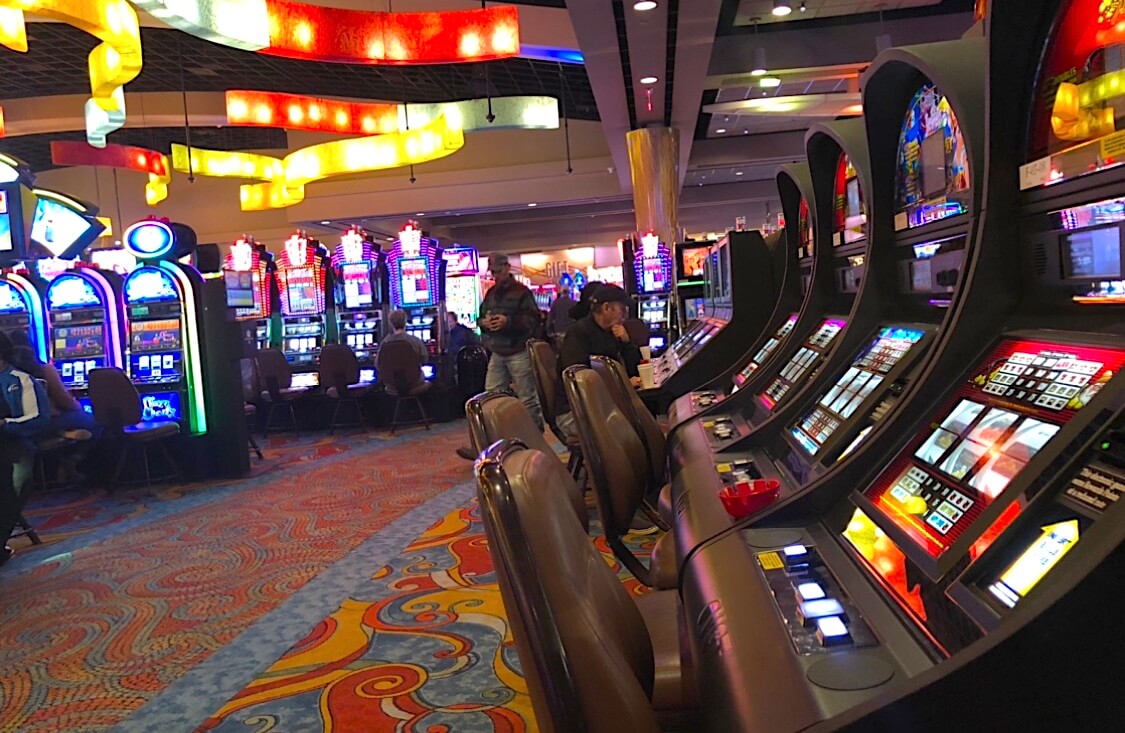
‘My drug of choice became blackjack’
Rick Brinkley knows that feeling.
To this day, the former pastor has never had a sip of alcohol or used drugs. From 2010 to 2015, he was a member of the Oklahoma Legislature, presiding over the Senate, chairing committee hearings and sponsoring bills. But on many weekends while in office, he would hop a plane to Las Vegas.
“I just didn’t want to be seen gambling,” he said. “And it’s the hypocrisy of any addiction. You make an excuse in your head or you justify it in your head, but at the same time you don’t want anyone to know you’re doing it.”
Brinkley’s addiction led him to steal at least $1.8 million, for which he spent 30 months in prison. He was released Oct. 16, 2018, and said he hasn’t placed a bet since March 28, 2015.
Brinkley said he knows some tribes donate considerably to problem gaming resources, but he said casinos should still “pay for the damage that they create.”
“I don’t blame the casinos for my addiction,” he said. “I just think that we need to look at what is the ultimate cost of this industry to our state and what they should be picking up the tab for in rectifying that situation.”
Brinkley said his gambling problem started in 2006 when his friends took him to an Oklahoma casino. There, he said, the outside world vanished, a common sensation in casinos — many studies have tried to pinpoint which gaming environments are most enticing.
“The casino became the spot where I escaped it all,” he said. “My drug of choice became blackjack.”
At the time, Brinkley was CEO of Tulsa’s Better Business Bureau. When he began embezzling to feed his gambling addiction, he told himself he would repay the money. He hid his secret well during his time in the Legislature, where he said he poured himself into his work.
“For some reason, people got this in their head that I got elected and then my life fell apart and it’s all because of politics and that kind of stuff,” he said. “That’s just not true.”
Brinkley said he never gambled on weekdays, mostly because senators work long, late hours. He confined his addiction to weekend trips.
A recent study linked problem gambling with higher suicide risk, a reality that Brinkley said he endured for quite some time. He used to carry a notebook, in which he wrote ideas for how to kill himself and make it look like an accident. From meetings with state officials to the Senate floor, the notebook never left his hand.
“In the craziness of addiction, you get to a point where it makes complete sense to you that your family and the world would be better off if you were not here,” he said.
Ironically, the publicity of Brinkley’s embezzlement case in June 2015 kept him from acting on his plans. He said he knew his death wouldn’t look like an accident with the charges over his head.
Somewhat like the National Suicide Prevention Lifeline, Oklahoma has the Problem Gambling Helpline, which Wiley Harwell operates with the state. When callers dial (800) 522-4700, they are directed to Gamblers Anonymous groups or to one of the state’s 40 centers that can receive funding for treatment.
Through Harwell’s Tribal Voices organization, at least three tribes post the number on their electronic billboards.
Still, Harwell said the helpline is the “best kept secret.”
“We have no money for advertising or for what we call ‘prevention,’” Harwell said. “So no one knows how to reach the Problem Gambling Helpline.”
In Brinkley’s case, Harwell’s nonprofit helped connect him to a rehab facility in Louisiana, one of the only centers in the nation specifically for gambling addiction recovery. He stayed there for just over a month in 2015.
Afterward, he attended 12-step programs. He then reported for prison in April 2016.
When he was released more than two years later, Brinkley briefly lived in a halfway house. He went on to work with Oklahomans for Criminal Justice Reform, and now he stays with family and works a part-time radio job.
Reflecting on his time in prison, Brinkley said most inmates were kind, intelligent people who were struggling with some kind of addiction. The biggest lesson he learned serving time, he said, was that incarceration isn’t always the answer.
“If (the state isn’t) adequately addressing the addiction problem associated with the (casino) industry, they’re going to continue to spend more on punishment, incarceration, prosecutions and all the other residual effects that it has on families,” Brinkley said.
‘Gaming provides 10 times more than what the federal government provides’
In 2012, President Barack Obama appointed Kevin Washburn, an Oklahoman and a member of the Chickasaw Nation, to be assistant secretary for indian affairs at the U.S. Department of the Interior.
In that job, Washburn ran several federal agencies that serve tribes, including the Bureau of Indian Affairs and the Bureau of Indian Education.
Washburn said that when he left the position in 2016, his operating budget was about $2.8 billion. The same year, nationwide gaming earned tribes $31.2 billion. The amount rose to $33.7 billion in 2018.
“Gaming provides 10 times more than what the federal government provides,” said Washburn, who is also dean of the University of Iowa’s law school. “It’s just a big source of revenue that tribes never had prior to gaming.”
At the same time, federal dollars for tribes often have spending rules attached, said Hoskin Jr. But gaming revenue allows for more flexibility.
“We can really write our own rules to tailor them for our communities,” he said.
The Cherokee Nation, which runs 10 of Oklahoma’s casinos, uses around 38 percent of its casino revenue to fund its governmental programs, Hoskin Jr. said. The rest is used for business development.
“Every penny of what we generate — in some form or fashion — is reinvested into the Cherokee people or the communities where they live,” Hoskin said.
(Editor’s note: Tres Savage contributed interviews to this story.)











